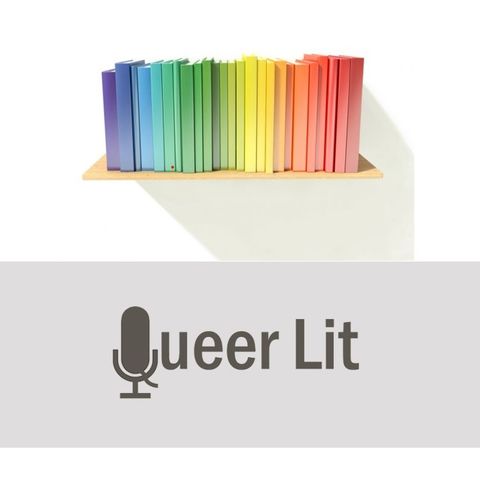"Queer Muslims" with Alberto Fernández Carbajal
18 mag 2021 ·
46 min. 27 sec.

Scarica e ascolta ovunque
Scarica i tuoi episodi preferiti e goditi l'ascolto, ovunque tu sia! Iscriviti o accedi ora per ascoltare offline.
Descrizione
Dr Alberto Fernández Carbajal (University of Roehampton) tells me all about their insightful book Queer Muslim Diasporas in Contemporary Literature and Film (2019) in this episode. We cover their favourite...
mostra di più
Dr Alberto Fernández Carbajal (University of Roehampton) tells me all about their insightful book Queer Muslim Diasporas in Contemporary Literature and Film (2019) in this episode. We cover their favourite reads and learn what a Muslim perspective can teach us about queerness. This kind of research is all about changing perspectives and fostering understanding, so I do hope you will be understanding when it comes to the sound of Alberto’s beautiful scarf that I was unable to remove from the audio entirely…
Check out Alberto's book here:
https://manchesteruniversitypress.co.uk/9781526128102/
Scholars and concepts mentioned:
John McLeod’s Life Lines: Writing Transcultural Adoption
https://www.bloomsbury.com/uk/life-lines-writing-transcultural-adoption-9781472590404/
Lena Mattheis’s Translocality in Contemporary City Novels
https://www.palgrave.com/gp/book/9783030666866
James Procter’s Diaspora
Sara Ahmed’s Queer Phenomenology
Abraham B. Weil’s Trans*versality
Ibn al-'Arabi’s Imaginal
Novels and films mentioned:
Abdellah Taïa’s Salvation Army
Hanif Kureishi’s My Beautiful Laundrette/The Buddha of Suburbia
Ian Iqbal Rashid‘s A Touch of Pink
Ferzan Özpetek's Hamam’s The Turkish Bath (Steam in the US)
Shamim Sarif's I Can't Think Straight
Sally El Hosaini's My Brother the Devil
Rolla Selbak's Three Veils
Rabih Alameddine: Koolaids/The Hakawati
Randa Jarrar's A Map of Home
Maggie Nelson’s The Argonauts
Audrey Lorde’s Zami: A New Spelling of My Name
Guess what? Alberto is on Twitter (@AlbyFCarbajal), as am I (@Lena_Mattheis).
Questions you should be able to respond to after listening:
1. Why is it important to think postcolonial and queer perspectives together?
2. What does ‘diaspora’ mean and why is it central to Alberto’s research?
3. What does intersectionality mean here?
4. What is the white saviour?
5. What does Alberto say about Muslim storytelling?
mostra meno
Check out Alberto's book here:
https://manchesteruniversitypress.co.uk/9781526128102/
Scholars and concepts mentioned:
John McLeod’s Life Lines: Writing Transcultural Adoption
https://www.bloomsbury.com/uk/life-lines-writing-transcultural-adoption-9781472590404/
Lena Mattheis’s Translocality in Contemporary City Novels
https://www.palgrave.com/gp/book/9783030666866
James Procter’s Diaspora
Sara Ahmed’s Queer Phenomenology
Abraham B. Weil’s Trans*versality
Ibn al-'Arabi’s Imaginal
Novels and films mentioned:
Abdellah Taïa’s Salvation Army
Hanif Kureishi’s My Beautiful Laundrette/The Buddha of Suburbia
Ian Iqbal Rashid‘s A Touch of Pink
Ferzan Özpetek's Hamam’s The Turkish Bath (Steam in the US)
Shamim Sarif's I Can't Think Straight
Sally El Hosaini's My Brother the Devil
Rolla Selbak's Three Veils
Rabih Alameddine: Koolaids/The Hakawati
Randa Jarrar's A Map of Home
Maggie Nelson’s The Argonauts
Audrey Lorde’s Zami: A New Spelling of My Name
Guess what? Alberto is on Twitter (@AlbyFCarbajal), as am I (@Lena_Mattheis).
Questions you should be able to respond to after listening:
1. Why is it important to think postcolonial and queer perspectives together?
2. What does ‘diaspora’ mean and why is it central to Alberto’s research?
3. What does intersectionality mean here?
4. What is the white saviour?
5. What does Alberto say about Muslim storytelling?
Informazioni
| Autore | Lena Mattheis |
| Organizzazione | Lena Mattheis |
| Sito | - |
| Tag |
Copyright 2024 - Spreaker Inc. an iHeartMedia Company
